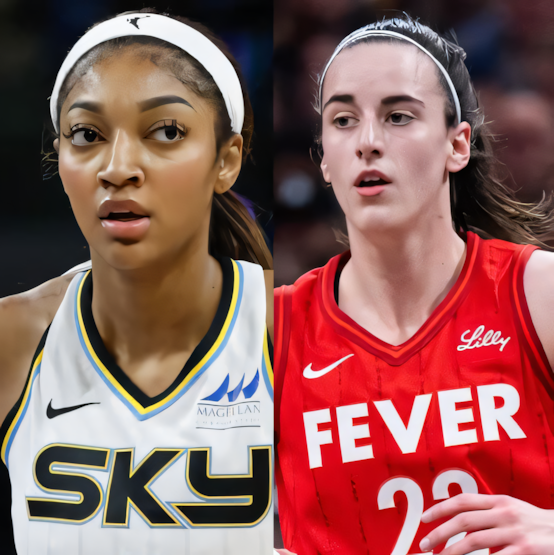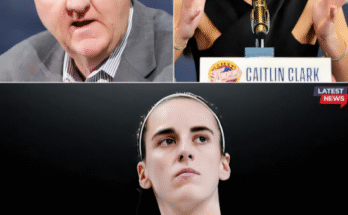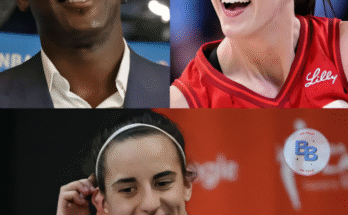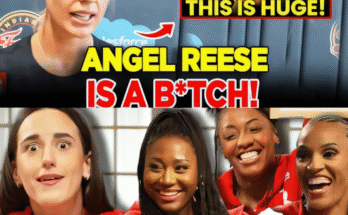In recent years, women’s basketball has surged in popularity, fueled by fierce rivalries, dynamic athleticism, and bold personalities. One of the most talked-about rivalries has been between LSU’s Angel Reese and Iowa’s Caitlin Clark—two stars who represent not only the future of the sport but also contrasting cultural narratives. Their matchups on the court have drawn millions of viewers, but recent off-court comments have sparked even deeper conversations that go far beyond basketball.
A viral Reels video circulating on social media has ignited widespread debate after Angel Reese reportedly referred to Caitlin Clark as a “scared white girl.” The phrase, pulled from a clip of Reese recounting an interaction with Clark during a heated game, has polarized fans and commentators alike, raising questions about race, gender dynamics, competitive expression, and the thin line between confidence and controversy.
The Context Behind the Comment
The video appears to show Reese speaking candidly about a moment in a high-stakes game where she felt Clark backed away from physical contact. “She didn’t want to guard me. She was acting like a scared white girl,” Reese said, with a tone that some interpreted as lighthearted trash talk and others viewed as racially insensitive.
Trash talk is nothing new in sports. From playground courts to professional arenas, athletes often engage in verbal gamesmanship to gain a psychological edge. However, when racial language is introduced—especially in today’s heightened cultural climate—the line between competitive banter and social commentary becomes blurred.
Reactions from the Public
Public reaction has been swift and divided. Supporters of Reese argue that her words are being taken out of context and that she is unfairly scrutinized for displaying the same boldness and confidence that male athletes are praised for. They point out that Reese, a young Black woman who has embraced her outspoken nature, is often villainized for behavior that would be lauded if she were a man—or white.
Others, however, argue that race-based insults, even in jest, are unacceptable, and that Reese’s comment unfairly reduces Clark’s character and skills to a stereotype. “If the roles were reversed, and Clark had said something similar, the outrage would be enormous,” one commenter wrote on X (formerly Twitter). “We have to hold everyone to the same standard.”
Caitlin Clark’s Response
As of now, Caitlin Clark has not directly addressed the viral video. Known for her composure and focus, Clark typically avoids engaging in off-court drama, preferring to let her game speak for itself. In previous interviews, she’s expressed respect for her opponents, including Reese, and has downplayed any narrative of personal animosity.
That said, her silence also reflects the broader reality that many white athletes are often shielded from racially charged controversy, while Black athletes face both implicit and overt biases when expressing themselves. This imbalance only adds to the complexity of how such incidents are perceived and discussed.
A Mirror for Society
The controversy is about more than just two basketball players. It serves as a lens through which broader issues of racial perception, media framing, and gender bias are being examined. Why is trash talk from Black women often portrayed as aggression, while the same from their white counterparts is seen as passion or competitiveness? Why are emotional outbursts from male athletes understood as part of the game, while women are expected to remain composed and polite?
Angel Reese has spoken before about how she’s judged more harshly because of her race and gender. After leading LSU to a national championship in 2023, she faced a wave of criticism for mimicking Clark’s celebratory gestures—something Clark had done herself in earlier games without backlash. That double standard is something Reese has vowed to challenge.
The Power and Pitfall of Social Media
Social media has transformed the way athletes communicate with fans and the world. It allows for authenticity and direct engagement, but it also magnifies every misstep and offhand comment. A 10-second video can spark days of debate, especially when it taps into deeper societal issues.
Reese’s “scared white girl” remark is now etched into the digital narrative of their rivalry, whether she intended it to be serious or not. And while some argue that this is just the colorful language of competitive sports, others see it as a missed opportunity to rise above stereotype-driven conflict.
Moving Forward
This moment is a reminder of the power athletes have—not just on the court but in shaping cultural conversations. Both Angel Reese and Caitlin Clark are talented, hardworking, and passionate competitors. Their rivalry has brought unprecedented attention to women’s basketball, and with that spotlight comes responsibility.
It’s possible for intense competition and mutual respect to coexist. In fact, that’s what fans deserve: a game played hard, emotions worn openly, but with a foundation of respect and fairness. If there is a lesson to be learned here, it’s that we can celebrate individuality and rivalry without crossing lines that divide more than they unite.
Conclusion
The viral nature of Angel Reese’s comment is indicative of a world that is hungry for drama but often unprepared to unpack the layers beneath it. Reese’s words, whether seen as jest or jab, have opened up necessary dialogue about how we perceive athletes based on race and gender.
In the end, both Reese and Clark are rewriting the script of what it means to be a woman in sports. It’s up to fans, the media, and institutions to rise to the moment and ensure that conversations born out of controversy become catalysts for understanding—not just outrage.



